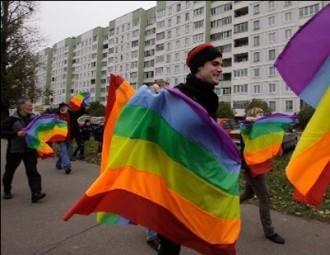Opinion: Pressure mounts on Belarusian LGBT community

Homosexuals in Belarus are facing mounting pressure from authorities, and they want the world to know about it.
Activists say their attempt to legally register the gay-rights organization GayBelarus, also known as Lambda, in January has sparked an angry response from the government of President Aliaksandr Lukashenka -- himself a self-proclaimed and unapologetic homophobe.
Members of the lesbian, gay, bisexual, and transgender (LGBT) community accuse police of summoning them for questioning, raiding their clubs, humiliating them and, in at least one case, using physical violence.
Siarhei Androsenka, the head of GayBelarus, says Belarusian homosexuals remain determined to emerge from the shadows. His group has actively reached out to international bodies and rights organizations this year, lobbying for support in countering the deepening crackdown on Belarusian gays.
The efforts have paid off, according to Androsenka. "Government repressions have taken the discussion of LGBT rights to a new political level. Now the issue of tolerance toward LGBT people in Belarus is being discussed at an intergovernmental level, in Brussels, at the OSCE, at the UN Human Rights Committee," he says. "We are not involved in politics, but we try to use international mechanisms to defend human rights."
Homosexuality was formally decriminalized in Belarus after the fall of the Soviet Union in 1991. But like in many former Soviet republics, antigay sentiments still run deep.
Lukashenka, a former collective farm director who has run the country with an iron fist for the past 18 years, himself has openly mocked homosexuals. He once proposed sending them to collective farms to perform public works.
And in 2011, after meeting with Germany's openly gay foreign minister, Guido Westerwelle, Lukashenka -- who has been dubbed "Europe's Last Dictator" -- famously said that "it's better to be a dictator than a gay."
Fight for justice
The recent woes of Belarusian homosexuals have not gone unnoticed. Amnesty International this year singled out GayBelarus member Ihar Tsikhanyuk for its annual Write for Rights campaign.
Tsikhanyuk has already received more than 300 messages of support through the so-called Letter-Writing Marathon, which runs from December 6 through December 17 and highlights 12 individuals or groups facing routine rights violations.
Tsikhanyuk says police in February dragged him out of the hospital where he was undergoing treatment for a stomach ulcer in his hometown of Hrodna. He says he was then taken to a police station where he was repeatedly beaten, insulted, and grilled about his sexual life.
Tsikhanyuk, who has since left Belarus, hopes the Write for Rights campaign will help raise awareness of the worsening conditions for homosexuals in his country. "I hope for greater awareness about homophobia in Belarus," he says. "I would like people to know more about it and to learn, like me, to fight for their own rights, to fight for justice -- not only with regards to homophobia but also to all injustices in Belarus."
Activists are planning to hold a gay-pride rally in Minsk on December 11, despite a ban from the authorities. Attempts to hold gay-rights demonstrations in the past have been quickly dispersed by police.
"Human rights are universal. The aim of the gay-pride [rally] is not to create trouble, we are simply fighting for our right to be ourselves, to be the way we are," Androsenka of GayBelarus says. "We want our lives, as well as our families, our friends, and our loved ones, to be safe."
Androsenka, too, recently fled Belarus after what he describes as threats from the authorities to himself and his family. Both he and Tsikhanyuk say they hope to return to Belarus soon to continue promoting tolerance of the LGBT community.
Originally published at RFE/RL
-
03.01
-
07.10
-
22.09
-
17.08
-
12.08
-
30.09



























